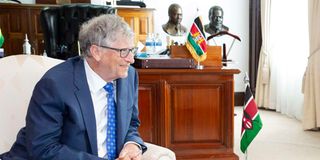Africa’s challenge of preparing its youth for the future

American tycoon Bill Gates at State House Nairobi on November 16, 2022. Youths had a chance to ask him a range of questions about the challenges and opportunities of the future that the youth will inherit.
Africa’s youths last Thursday evening had a rare chance to ask the seriously wealthy philanthropist Bill Gates a range of questions about the work of the foundation he co-chairs with Melinda Gates and generally about the challenges and opportunities of the future that the youth will inherit.
A key takeaway is that the challenges (and opportunities) are immense, but with the equally troubling question whether these youth are being sufficiently prepared to take on those challenges and harness the opportunities.
The overriding challenge is that being triggered by climate change, courtesy of global warming, which has significantly disrupted weather patterns across the globe.
The world is heating up dangerously and there is little likelihood that the greenhouse emissions that have upended weather patterns will be reduced to zero by 2050 to keep global warming at the acceptable level of 1.5 degrees Celsius.
Dangerous hydrocarbons
The message to Africa since the Paris Agreement of 2015 is that it can expect insignificant support from the largest emitters of the dangerous hydrocarbons that are causing so much grief.
Our youth must, therefore, be ready to steer a smallholder farmer-dependent continent through the grim reality of uncertain rainfall, freak storms and murderous heatwaves.
This is happening in a world turning nationalistic and inward-looking, as equally tough challenges force even the rich to start minding their own business.
As Mr Gates said, the reality is that there is no large basket of climate cash that can readily fund climate mitigation and climate adaptation initiatives that have been identified at national and regional levels.
In terms of preparing the youth to tackle these challenges, the continent and Kenya score pathetically.
Unesco tells us that there are about nine million students in tertiary learning institutions in Africa, which represents three per cent of all student enrolment (about 260 million) on the continent. The nine million is four per cent of students in tertiary institutions globally.
South Sudan is the worst at less than one per cent of its students in tertiary institutions, followed by Malawi and countries like Sierra Leone, Equatorial Guinea and the Gambia.
Our neighbours Uganda and Tanzania are at two per cent. Kenya is at four per cent. Mauritius is the best performing at around 14 per cent. Sudan, Namibia, South Africa, Cabo Verde and Botswana are all around eight per cent. The continent contributes one per cent to global research!
These unflattering numbers become even more shocking when broken down into how many among those enrolled are undertaking courses in the maths and sciences. Africa will clearly not have sufficiently trained local expertise to innovate solutions around very basic challenges that are nonetheless life-threatening.
This is tragic because it means that dependence on largesse from organisations like the Bill and Melinda Gates Foundations will increase rather than reduce.
It also means that available resources – like the Sh850 billion that Mr Gates pledged to spend as additional funds to what his foundation has already committed over the next four years – may not stretch as far as it could otherwise have gone with ample local input of cash and skills.
The foundation has already contributed immensely to improving health (especially maternal health, reducing infant mortality, tackling malaria and mitigating the ravages of HIV-Aids).
Through numerous global and local partners like the Alliance for a Green Revolution in Africa (Agra), Kalro, and a myriad others, the Bill and Melinda Gates Foundation has supported transformative innovations that have spawned improved seed varieties, exposed farmers to improved agricultural practices, opened up markets for them, etc.
But this laudable work must be amplified and spread across the continent if true benefits are to accrue in a sustainable manner.
The Covid pandemic demonstrated how fragile most of our systems are, most notably the food system. Our countries need local expertise to stretch the impact of the work of philanthropic foundations in the specific areas that they work.
Global systems
Expertise is needed to work in areas of policy that strengthens institutions working in the development space. Knowledge on how global systems work and relate at international, regional and levels is critical.
For Africa, this is dire because our bargaining position is feeble. Hardly can we negotiate as individual nations yet we are unable to carve, articulate and stick to common positions. And sadly, most of the expertise we have now works for non-African agencies.
I am sure that the more the 15,000 or so youth that tuned into the Bill Gates conversation did not leave with solutions to the enormous challenges of the future.
But they sure got the message that the challenges and opportunities are immense and global, they require big ideas, big money and razor-sharp focus. Yet, the context is that African governments are not investing enough to prepare the youth to lead this continent.
Mr Mshindi, a former editor-in-chief of Nation Media Group, is now consulting. [email protected]; @TMshindi





